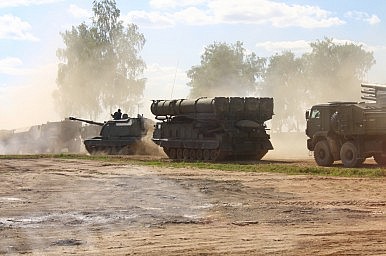
Russia and its
military partners across Asia have been busy practicing. While the
Russian Navy is engaging in exercises with China in the Sea of Japan
(which The Diplomat’s Franz-Stefan Gady covered here),
its air force has been exercising with units from the Commonwealth of
Independent States (CIS), and the Collective Security Treaty
Organization (CSTO)’s Rapid Reaction force (CRRF) is also engaging in
exercises. While the CSTO exercises are an annual event, this year’s
location has drawn increased attention.
Cooperation 2014 unfolded in Kazakhstan, attended by over
3,000 soldiers from Armenia, Belarus, Kazakhstan, Kyrgyzstan, Russia and
Tajikistan, focused on “psychological and cyber warfare for the first time.”
The 2015 edition is being staged in Pskov, a city in western Russia less than 25 miles from the Estonian border. According to the CSTO, about 2,000 soldiers are participating, with 200 vehicles and 40 aircraft and helicopters. Half of the troops participating are Russian.
Kazakhstan reportedly sent a nuclear, chemical, and biological defense
unit comprising of about 70 soldiers. Kyrgyzstan sent 50 soldiers and
Tajikistan sent a platoon.
According to CSTO’s statement, the CRRF “will conduct a
joint operation to localize an armed conflict with the aim of restoring
territorial integrity and defending constitutional order in a simulated
CSTO member state, working out tasks for destroying irregular armed
formations.” RFE/RL reported
that Russian General Vladimir Shamanov, who is overseeing Cooperation
2015, said the drills would practice “localizing an armed conflict and
eliminating illegal armed formations in the Eastern European region.”
Although this year’s exercise is smaller, the choice of
location, along with the declared focus of the drills, is provocative
due to ongoing tensions with Europe over Russia’s involvement in
Ukraine. One European think tank pointed out in a recent report that both NATO and Russia’s patchwork of Eurasian alliances are training to fight each other:
Whilst spokespeople may maintain that these operations are targeted against hypothetical opponents, the nature and scale of them indicate otherwise: Russia is preparing for a conflict with NATO, and NATO is preparing for a possible confrontation with Russia.
The six-day CSTO exercises kicked off on August 23.
Shamanov said that after the exercises, the participating soldiers and
equipment will be redeployed to Russia’s Astrakhan region for further
training.
Meanwhile, the CIS are also engaging in exercises in Russia, called Combat Commonwealth 2015, according to Sputnik. The first phases of joint air defense drills began on August 18.
The Russian defense ministry said that about 20 air defense and missile
defense units would be participating, including over 1000 troops, 200
units of equipment including S-400 “Triumf” and S-300 “Favorit”
anti-aircraft missile systems, as well as MiG-29s, MiG-31s, a fleet of
Sukhoi multirole fighters, and helicopters. The first phase is scheduled
to end on September 11 at which point the units will be redeployed,
also to Astrakhan.
TASS reported Friday
that Russian air defense and Air Force units were expected to take part
in “major exercises” in the country’s southern military district, which
is centered in the north Caucasus, including both the Caspian flotilla
and Black Sea fleet. Crimea, annexed by Russia in April 2014, is a de
facto part of this district as well.
The district’s press service reported that “Preparations
for large-scale Air Force and air defence war games, which will be held
at the end of September and will involve missile launches, are nearing
completion in the Southern Military District… The drill assignments will
presuppose operations with the aid of Igla shoulder-carried missile
launchers, Tunguska antiaircraft gun complexes, Shilka antiaircraft
missile launchers, as well as S-300, Buk M1-2, Strela-10, Tor, and Osa.”
While the CIS is a loose association, it has maintained a
council of defense ministers and established an air defense system in
the mid-1990s. The CSTO began as an outgrowth from the CIS, and was
established in 2002 as a military alliance. The CSTO’s rapid reaction
force has been exercising near many of he region’s hotspots, in Tajikistan in May
simulating fending off a Taliban invasion and now near Europe. Central
Asia’s troop presence at such exercises is small relative to Russia’s,
but participating helps reinforce the region’s links to Russia.
In related news, Tengrinews reports that Kazakhstan’s ministry of defense says that Moscow gave Astana five missile defense systems for free.
“These S300PS air defence missile systems will be tested
during live fire exercise and transferred to military bases of
Kazakhstan’s Air Defence Forces to be in operation readiness covering
the airspace of the Republic of Kazakhstan,” the Commander of
Kazakhstan’s AA Troops Nurzhan Mukanov said.

No comments:
Post a Comment